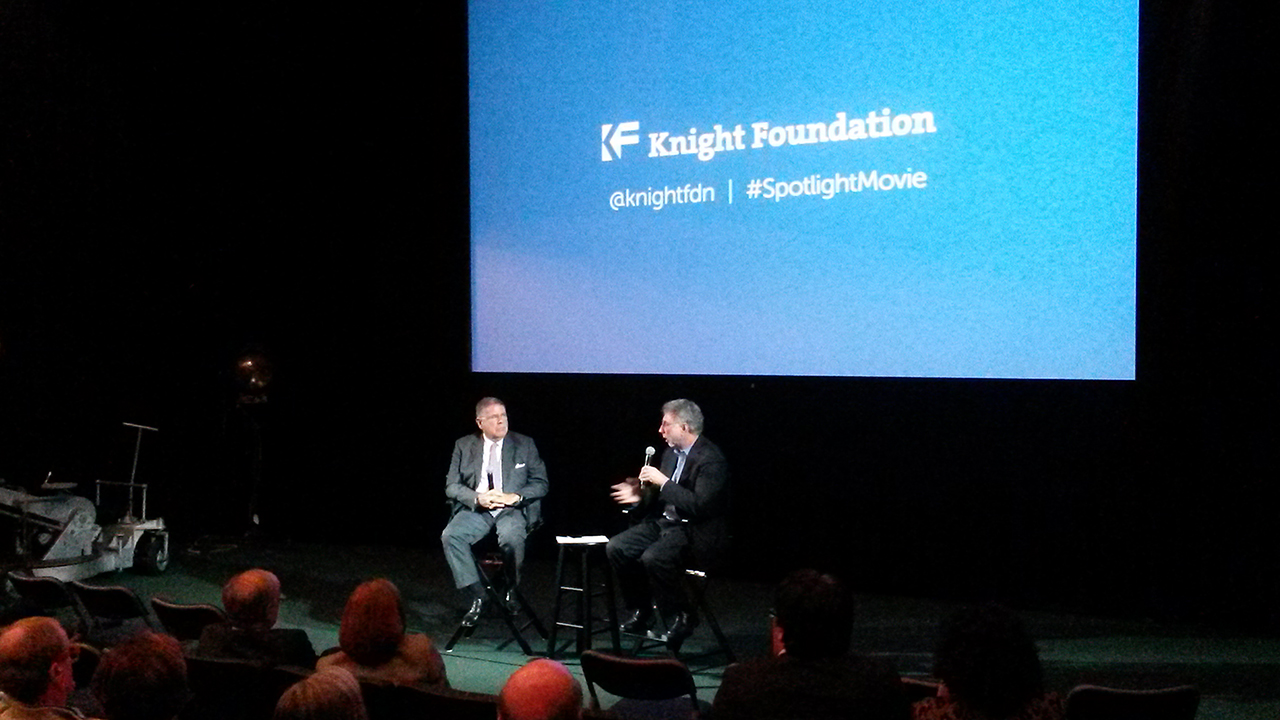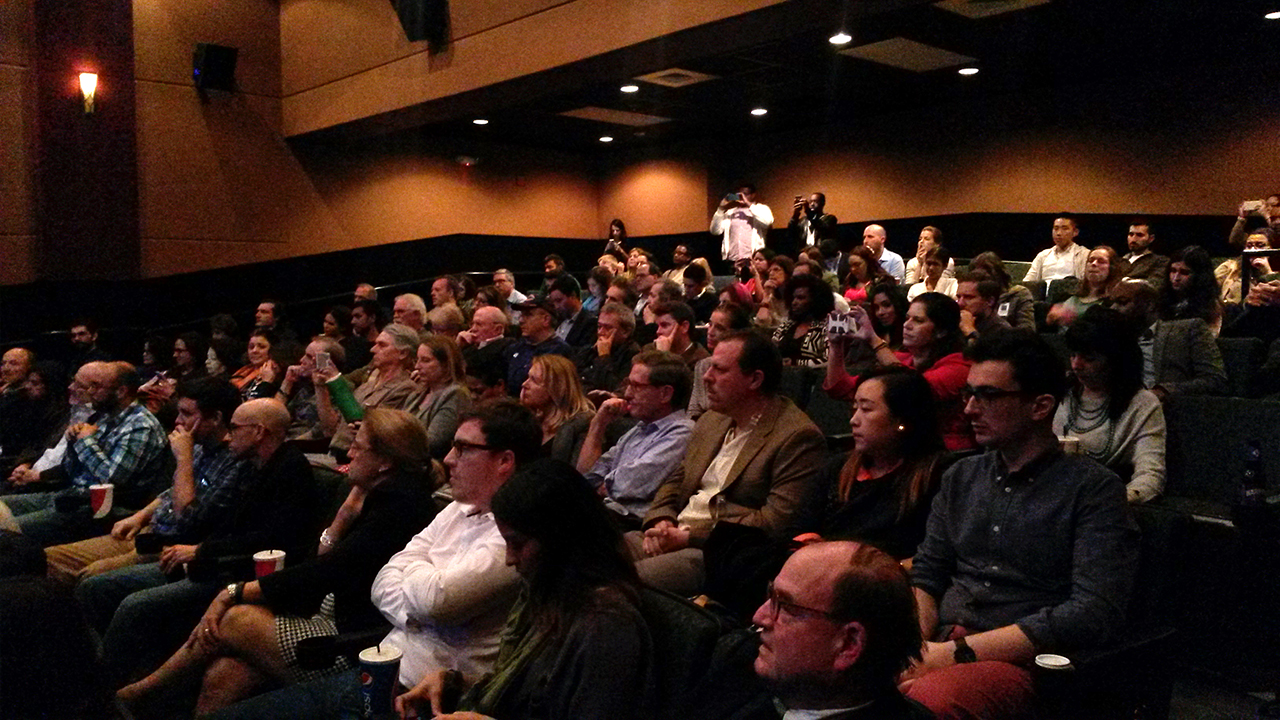
How ‘Spotlight’ is the ‘best argument’ for journalism

Photos: Knight Foundation President Alberto Ibarguen and Washington Post Executive Editor Marty Baron followed a screening of the movie “Spotlight.” Credit: Rosemary D’Amour.
“Spotlight” is a film with no car chases, explosions or intergalactic battles. An action scene here might be someone with a pen and a ruler checking names in a book or running to the courthouse to get, just before closing, some previously sealed documents. Victory here brings only the revelation of a monstrous truth.
In spite of it, or perhaps in part because of it, the film has become a modest box office success and has received numerous honors, including nominations for six Academy Awards. Its depiction of the hard work of news investigations has fueled discussions about the importance of local journalism, including a screening last Thursday by Knight Foundation at Coral Gables Art Cinema followed by a conversation led by Knight President Alberto Ibargüen with Marty Baron, executive editor of The Washington Post and editor of The Boston Globe from 2001 to 2012.
“Although in Miami we seem to be better known these days for our support of the arts and entrepreneurship, our signature program has traditionally been the Journalism Program,” noted Ibargüen, a former publisher of the Miami Herald and El Nuevo Herald. “‘Spotlight,’” he said, “is about the best argument I’ve heard recently for journalism.”
The film, based on actual events, follows the investigation of sexual abuse in the Roman Catholic Church by a team of reporters and editors at The Boston Globe. Call by call, interview by interview, the Spotlight team peels off decades of a systemic cover-up that reaches high up into the Boston religious, legal and political establishment. The Globe published the first story on Jan. 6, 2002. Many followed. The series led to the resignation of Cardinal Bernard Law, archbishop of Boston, and earned the Globe a Pulitzer Prize.
Asked about how true the film was to real life, Baron, who wryly noted that Liev Schreiber, the actor who portrays him, represented “a big upgrade” to his looks, said, “Overall, [the film] was a very faithful representation of what happened.”

“The initial emphasis was that they found a lot of priests, that it wasn’t just one priest, this John Geoghan who had been accused of abusing as many as 80 kids … but they had found dozens upon dozens of priests,” he recalled. “I was very concerned that … it would be just a story about a lot of priests who abused kids, and to me that would sound, to the average reader, as pretty sensational. So I wanted to get beyond the sheer numbers. I wanted to get to the policy. What is the practice? What does the church actually do when it discovers abuse? Did it take people out of ministry or did it simply reassign them to another parish where they would abuse again? And, did they do that with many priests over a long period of time? That’s what I wanted us to get at.”
The impact of the series, however, rippled well beyond Boston — witness the postscript of the film, as screen after screen shows the lists of cities around the world where similar abuse and manipulation was uncovered. The cumulative effect is devastating.
“After we did this work and people saw the work that we did and the impact it had, other news organizations, particularly newspapers around the world, started doing this work,” said Baron. He highlighted the work of The Los Angeles Times, which, as part of its reporting, had to engage in “a very expensive court battle” with the church to unseal documents. The stories led in July 2007 to a public apology from the church and Cardinal Roger M. Mahony, head of the Archdiocese of Los Angeles, as well as a settlement of $660 million with 508 victims. Mahony retired in 2011, but was eventually relieved of his remaining public and administrative duties.
The conversation after Thursday’s screening focused on the journalism depicted in the film before broadening to address questions about the state of journalism and investigative reporting (“There is very good investigative reporting going on in many places, but there’s not enough of it. That’s the problem,” said Baron) and the business model that could support metro newspapers.
“The truth is, I can’t sit here and tell you what the economic model is. We are still working on what the model is for the national ones,” said Baron, who noted that The Washington Post, after being purchased by Jeff Bezos, founder and CEO of Amazon.com, moved from “a newspaper for and about Washington,” to a national news organization. The shift in perspective was the catalyst for new strategies such as the development of The Washington Post Talent Network, a nationwide freelance journalist network.
“One of the things we wanted to do was to extend our reach journalistically,” he said, arguing that the old system of correspondents was “inefficient and very costly.” “Now, when we had these mass shootings around the country … we’ve been able to have somebody very close by that we can call on to cover that story and get to the scene very quickly.”
As for the place of a journalist in the local community, the film shows Baron, an outsider to Boston, fresh from Miami, Jewish in a largely Catholic city, unmarried and uninterested in sports, facing a web of old institutional relationships and personal loyalties. A central paradox in “Spotlight” is that probably only an outsider like Baron could have brought to light a story that affected so deeply so many people and institutions in such close community. That prompted a question from the audience about what might be better for a young journalist: covering a place they know well or going somewhere “with fresh eyes.”
“Both can be advantageous,” said Baron. “I don’t think you have to be an outsider to be successful, and it helps if you know the community. What you have to keep in mind is that you have to maintain your independence. You are part of the community but you can’t be beholden to it or the powerful interests in the community. You should always feel that those interests could be challenged and should be challenged when you have information that is well documented. … I think that’s one of the themes in this movie: Journalists have to be independent and that serves the community.”
Fernando González is a Miami-based arts and culture writer. He can be reached via email at [email protected]
Recent Content
-
Journalismarticle ·
-
Journalismarticle ·
-
Journalismarticle ·


